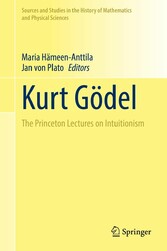Suchen und Finden
Service

Kurt Gödel - The Princeton Lectures on Intuitionism
Maria Hämeen-Anttila, Jan von Plato
Verlag Springer-Verlag, 2021
ISBN 9783030872960 , 133 Seiten
Format PDF
Kopierschutz Wasserzeichen
Geräte
Paris of the year 1900 left two landmarks: the Tour Eiffel, and David Hilbert's celebrated list of twenty-four mathematical problems presented at a conference opening the new century. Kurt Gödel, a logical icon of that time, showed Hilbert's ideal of complete axiomatization of mathematics to be unattainable. The result, of 1931, is called Gödel's incompleteness theorem. Gödel then went on to attack Hilbert's first and second Paris problems, namely Cantor's continuum problem about the type of infinity of the real numbers, and the freedom from contradiction of the theory of real numbers. By 1963, it became clear that Hilbert's first question could not be answered by any known means, half of the credit of this seeming faux pas going to Gödel. The second is a problem still wide open. Gödel worked on it for years, with no definitive results; The best he could offer was a start with the arithmetic of the entire numbers.
This book, Gödel's lectures at the famous Princeton Institute for Advanced Study in 1941, shows how far he had come with Hilbert's second problem, namely to a theory of computable functionals of finite type and a proof of the consistency of ordinary arithmetic. It offers indispensable reading for logicians, mathematicians, and computer scientists interested in foundational questions. It will form a basis for further investigations into Gödel's vast Nachlass of unpublished notes on how to extend the results of his lectures to the theory of real numbers. The book also gives insights into the conceptual and formal work that is needed for the solution of profound scientific questions, by one of the central figures of 20th century science and philosophy.
Shop


